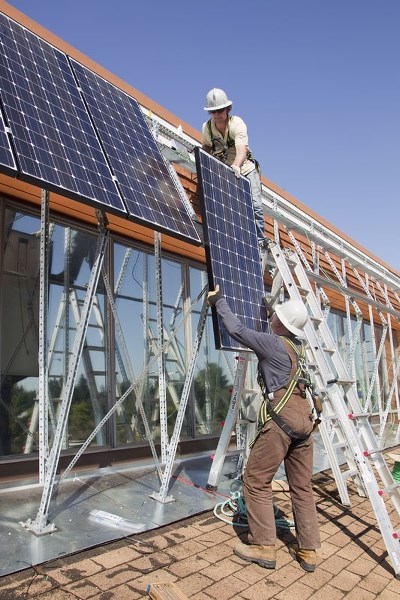A simple, 14-word change to the law that governs Alberta's cities could make it easier to build green homes, says a St. Albert energy expert.
Leigh Bond of St. Albert's Threshold Energies Corp. was a speaker at the ReEnvision Housing Symposium in Morinville last Sept. 15. Organized by the Capital Region Board, the annual conference drew experts from across the region to discuss affordable housing.
Bond was part of a panel discussion on energy-efficient homes. He and Rob Appleyard of the non-profit Brentwood Community Development Group spoke on how they built an affordable housing complex in Edmonton in 2011 that's fairly close to being net-zero in terms of greenhouse gas emissions.
Green technologies can be expensive, but that doesn't mean we should exclude them from affordable housing, Appleyard said. Despite outfitting the Brentwood complex with a vast array of green technologies, it ended up costing about $190,000 per unit – very close to what they would have spent had they built a traditional complex.
"It really didn't add that much expense," he said.
Paying for green tech
Appleyard said his group, which builds affordable housing, decided to build a net-zero complex in order to foster community health, reduce greenhouse gas emissions, show leadership and reduce operating costs.
The Brentwood complex was built to use zero net energy over the course of a year. That meant using a ground-source heat pump for heat, solar modules for electricity and hot water, and heat-recovery ventilators, excellent air sealing and ultra-thick insulation for energy savings.
These measures, combined with about 160 solar panels, mean that the complex has eliminated about 70 per cent of its greenhouse gas emissions, Bond said. The complex could become net-zero in terms of emission with more panels.
Appleyard said putting in all these energy-saving and producing systems meant that the Brentwood group could cut out a lot of other expensive items such as furnaces and reduce its energy costs. While these systems didn't make financial sense on their own, combined, they proved affordable.
"It's the combination of all these technologies that makes the difference."
Appleyard said efficiency can be a tough sell to buyers, as they often prefer granite countertops over cheaper utility bills.
One solution is to educate people about the significance of those savings. Barrhead's new arena was built so that its ice-making plant heats the arena's seats and a nearby pool, for example, and now saves the town about $80,000 a year in operating costs.
"There are energy efficiencies there that would blow your mind," he said.
Another is to be a non-profit. As Brentwood wasn't looking to sell this building, it had an incentive to invest in efficiency, and could do so without shareholders pushing for short-term gains. Municipalities are in a similar position with their affordable home projects, Appleyard said.
The biggest barrier to going green is the up-front cost, Bond said. Green tech takes time to pay off, and if you sell your home before you get your money back, the new owner gets the benefits of the tech without having to pay for it.
Bond said the solution is to allow cities to fund green improvements with the Property Assessed Clean Energy (PACE) finance model, which is now used by 37 U.S. states.
Under PACE, instead of a homeowner paying the up-front cost of a green improvement, the municipality does and recoups its costs over time through property taxes. The municipality gets its money back over the life of the improvement and the owner doesn't lose money if he or she sells the house before paying off the cost.
"We need about a 14-word change to the Municipal Government Act (MGA) to make PACE happen in Alberta," Bond said.
Alberta Municipal Affairs spokesperson Shannon Greer said in an email that Minister Danielle Larivee had met with energy efficiency advocates and was considering PACE as part of upcoming revisions to the MGA. Those revisions will be tabled later this fall.




